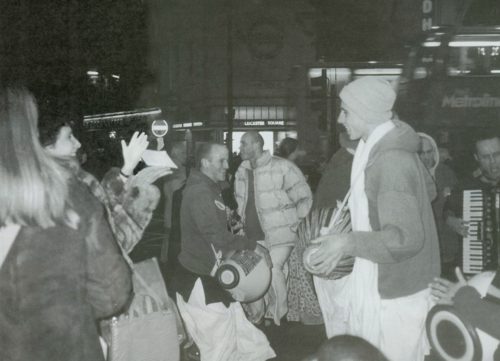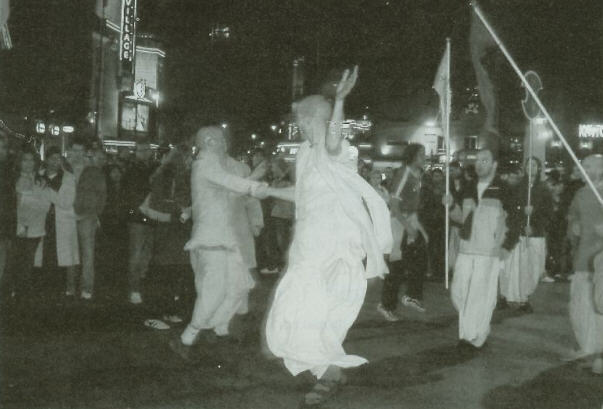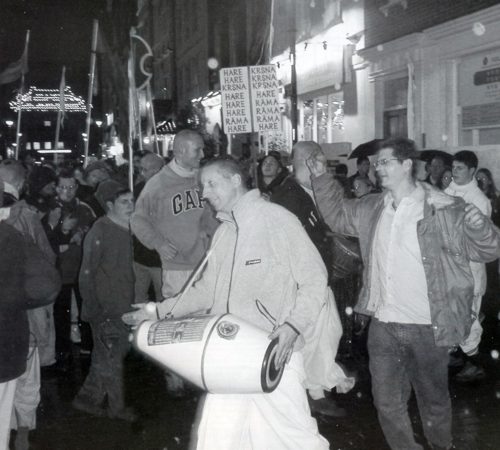Lord Krsna's holy names bring light to downtown London on a Saturday night.
WE CROSS Oxford Street with five mrdanga drums, two loud and deep African drums, karatala cymbals, an accordion, and an electric guitar.  Our chanting party consists of over a hundred members, from so many countries and ethnic backgrounds that the diversity is startling. There are men in dhotis, in suits, and in jeans, women in saris, colorful dresses, and subdued business clothes. We race or dance down the street, singing as fast as we run, churning up waves of spiritual joy.
Our chanting party consists of over a hundred members, from so many countries and ethnic backgrounds that the diversity is startling. There are men in dhotis, in suits, and in jeans, women in saris, colorful dresses, and subdued business clothes. We race or dance down the street, singing as fast as we run, churning up waves of spiritual joy.
The lead singer wears a wireless microphone on his head, and one member of the group carries a loudspeaker in a backpack. The electric-guitar player has his own speaker. So many devotees respond to the lead singer's chanting that all the words of the great mantra for deliverance Hare Krsna, Hare Krsna, Krsna Krsna, Hare Hare/ Hare Rama, Hare Rama, Rama Rama, Hare Hare distinctly echo through the London streets.
To this native New Yorker, the streets are narrow and the buildings short, but the atmosphere is that of any major Western city on a Saturday night. Many in the crowd must see us each week, but there are also large numbers of tourists and people who come from around the country to sample the culture of central London. And there is much to sample pubs, gambling houses, live theater, movie houses with multiple screens, discotheques that open at 9:00 P.M., and shops of all variety.
But all the glitter of this great Western city, old with history and achievement, is, from the spiritual point of view, a subculture. The activities here, advertised by seductive models under flashing colored lights, draw humanity far away from the qualities that build a foundation for enlightenment, qualities that demarcate us as human. The people lining the streets are not thinking of enlightenment as they laugh in the outer darkness of night and the inner darkness of lust, greed, intoxication, and sensual enticements.
Spontaneous Dancing
Yet the chance for enlightenment comes. Our group randomly runs, jumps, and leaps across the streets, under archways, and even into the subway, where the acoustics intensify the chanting.  In parks or streets closed to traffic, we linger for some time, sections of our group spontaneously performing dances that seem choreographed. An appreciative crowd gathers. I'm amazed by how many people join the dancing, carry our flags and banners for a while, sing with us, or simply smile, wave, or nod. I try to make eye contact with as many onlookers as possible, smiling and drawing them into the chanting. Hecklers appear, too, but their harsh condemnation drowns in our overflowing happiness and enthusiasm.
In parks or streets closed to traffic, we linger for some time, sections of our group spontaneously performing dances that seem choreographed. An appreciative crowd gathers. I'm amazed by how many people join the dancing, carry our flags and banners for a while, sing with us, or simply smile, wave, or nod. I try to make eye contact with as many onlookers as possible, smiling and drawing them into the chanting. Hecklers appear, too, but their harsh condemnation drowns in our overflowing happiness and enthusiasm.
One man quietly tells me he has read Bhagavad-gita but doesn't understand why there should be love and violence in a spiritual treatise. Alongside the chanters, we talk for a while about how God is the source of everything, including love and fighting. In God, Krsna, these feelings and activities exist in their original, pure form. Reading or hearing of these will purify us from the base forms of lust and anger. Lust, anger, and greed are gates to suffering in this and future lives, but the spiritual originals, of which these are a twisted counterpart, are a source of varieties of great pleasure.
Some members of the party hand out books, magazines, or invitations to the next festival, but most of us are caught up in the mantra, the melody, and the movements that naturally express themselves in our bodies. We cannot help but dance. How can we dance and sing publicly with such abandon? Some onlookers probably assume we've been drinking, but we take no alcohol or other intoxicants and many of us are shy. Others only familiar with quiet personal meditation may be surprised that total absorption in a mantra would express itself as public exuberance. One member of the chanting party is out for the first time, nervously wondering if his boss is sitting at a restaurant window we pass. Perhaps some of us consider what people will think of our acting like madmen, but most of us are so absorbed in the chanting that public opinion seems like a far-away dream of no value.
The Great Call To God
The greatest mystery is the mantra itself, its meaning and power, and the effect on those of us who abandon ordinary decorum to sing it on busy streets. It is a prayer, a hymn, but of the greatest intensity and intimacy of all calls to God.
The mantra is a direct address: "O Krsna, Supreme Lord, Absolute Truth, the most attractive person because of Your incomparable and unlimited beauty, wealth, fame, strength, intelligence, and renunciation! O Hara, Radha, female consort of the Lord, who steals His mind with love and takes away our material attachment and suffering! O Rama, supreme reservoir of all pleasure, who enjoys transcendent love in Your own kingdom!"
What do we ask for when we call out to Krsna and His supreme energy? Service. The mantra is a plea for loving service and for connection yoga in divine love.
We ask not for material wealth, fame, sensual and mental pleasure, or even salvation apart from serving Krsna. As such, the mantra we sing with captivating melodies and expert musical accompaniment is the key to the highest levels of religious and spiritual understanding and experience. It embodies the summit of purity and ecstatic divine love. The mantra is composed of the names of God, and His name is more than blessed it is God Himself in a form of utmost mercy. Additionally, hidden in the arrangement of the divine names is the most secret and intimate beatitude shared between Krsna and His consort, Radha: Their meeting and blissfully anguished separation, only to meet and separate again.
Entering All Hearts
How is it that the Hare Krsna maha-mantra which invokes supreme mystery and power and is the most secret inner truth of the Absolute Truth appears from our mouths among the weekend revelers?  To fully enter into the chanting of the maha-mantra, to even be qualified to hear and chant it, would seem to be reserved for the most pure and austere of spiritual adepts. Yet the maha-mantra, while containing essential truth generally revealed only to the most exalted saints, is a form of Krsna so benevolent that it enters the hearts of even the most materialistic. The tipsy passerby who sings with us in his partying mood gets a seed of spiritual understanding. The people who nod and wave or merely hear start their journey to perfection.
To fully enter into the chanting of the maha-mantra, to even be qualified to hear and chant it, would seem to be reserved for the most pure and austere of spiritual adepts. Yet the maha-mantra, while containing essential truth generally revealed only to the most exalted saints, is a form of Krsna so benevolent that it enters the hearts of even the most materialistic. The tipsy passerby who sings with us in his partying mood gets a seed of spiritual understanding. The people who nod and wave or merely hear start their journey to perfection.
Those of us for whom chanting the Hare Krsna mantra is a way of life chant not only periodically on the street but daily in group singing and in quiet personal meditation. Indeed, the ripe fruit of perfection is to chant incessantly, the mantra becoming the essential part of one's life.
Cultivating the fruit is a science, from planting the seed to harvesting. An expert gardener in this spiritual science learns and practices the art of chanting Hare Krsna, Hare Krsna, Krsna Krsna, Hare Hare/ Hare Rama, Hare Rama, Rama Rama, Hare Hare to achieve the full effect expeditiously and without deviation.
The science requires expert guidance, a life of purity and goodness, a mood of self-surrender, and avoidance of pitfalls. The essence is to have a life where everything is done as an offering to Krsna, with the help of a spiritual master to whom one has firmly committed. Such a life includes the regular study of scriptures such as the Bhagavad-gita and the Srimad-Bhagavatam, living in a holy place (or sanctifying one's home), and making intimate friendships with like-minded devotees.
The pitfalls are intoxication, illicit sex (sex should be only in marriage for procreation), gambling, and eating of meat, fish, or eggs. One should also avoid offending or displeasing the mantra, understanding that the mantra is the same as the person Krsna and wants to be approached in a particular way.
Avoiding Offenses
The Padma Purana lists the following offenses to the Lord's name: To offend devotees of the Lord, to consider Krsna's name to be equal to that of an ordinary being (even a demigod), to disobey the spiritual master, to blaspheme scripture, to interpret the mantra in a mundane way, to think its glories are exaggerated, to intentionally sin with the idea that the mantra will purify one, to consider the chanting to be material piety, to tell the name's glories to the faithless, to chant without attention, and to chant without faith or while keeping material attachments.
By carefully applying both the positive and negative standards, an aspirant for entering eternal bliss and knowledge will achieve the result quickly, even in this life. But anyone, serious or not, can take pleasure in the surge of spiritual energy that transforms the streets when Krsna's devotees share the best secret with the world.
Hard To Stop
Our large group gradually makes its way around Soho Square and back to the temple. Few people are on the streets here, and it's late for us, who rise well before the sun. Yet we cannot stop so easily. Someone is collecting the flags and banners, but the chanting continues to fill the street for a while. We remember how Lord Krsna finds the greatest pleasure by appearing as Sri Caitanya Mahaprabhu in the mood of His own devotee and chanting like this all night in the company of His associates. Regrettably, my body, made of bone, muscle, and blood, must rest. But I hope that Krsna mercifully allows me one day to sing His name forever.
Urmila Devi Dasi and her family run a school in North Carolina. She is a frequent contributor to BTG and the major author and compiler of Vaikuntha Children, a guide to Krsna conscious education for children.
